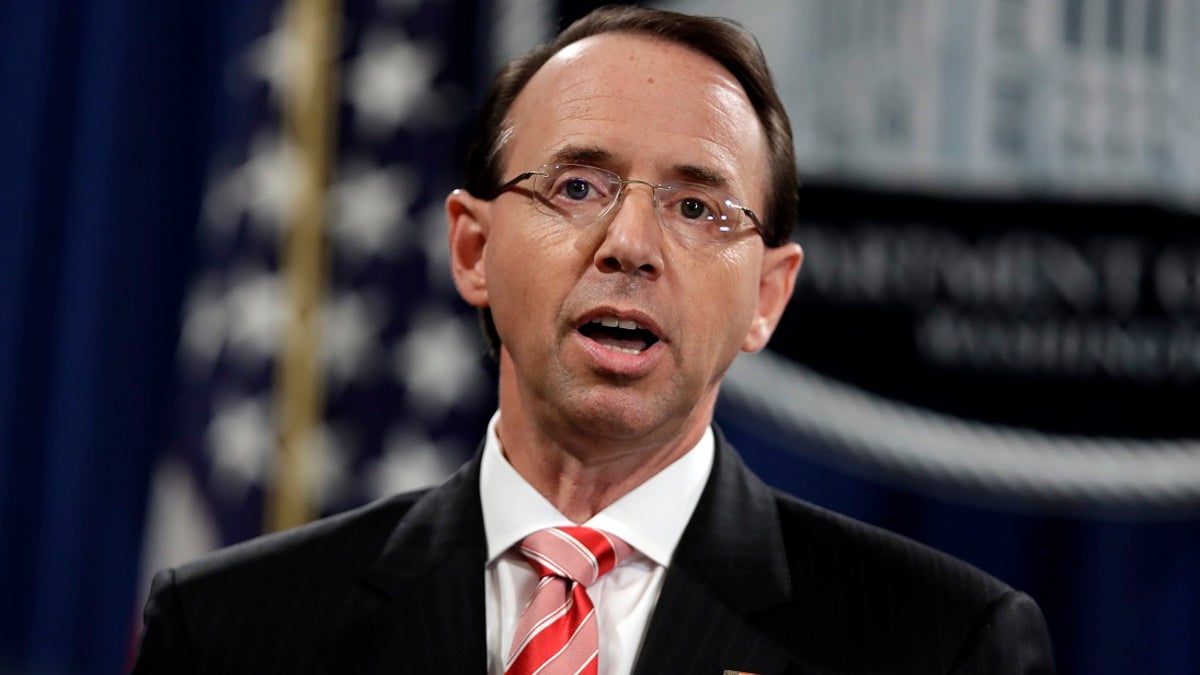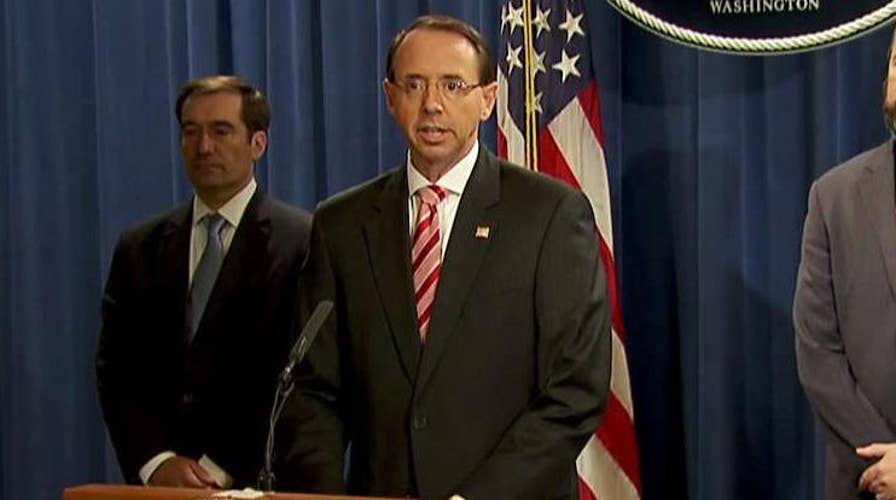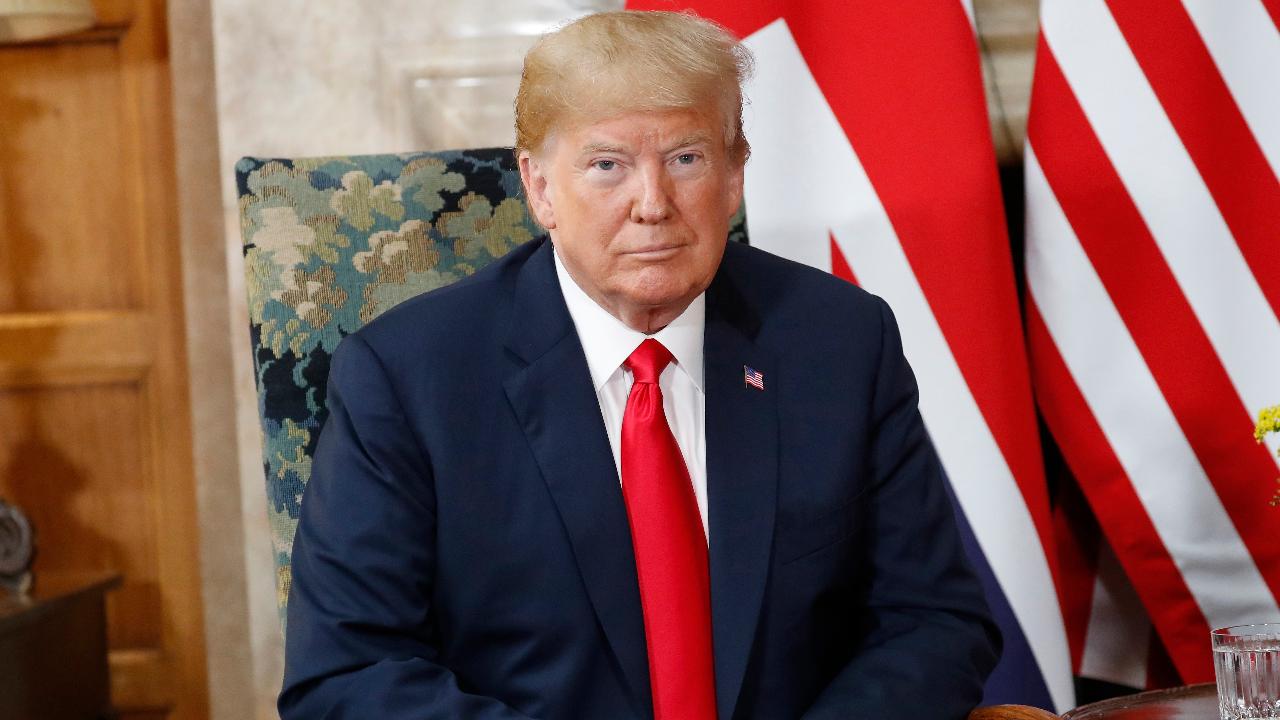12 Russian intel officers indicted for hacking the DNC
Deputy Attorney General Rosenstein announces indictment of 12 Russians for hacking the DNC during the 2016 election.
The Justice Department announced charges Friday against 12 Russian intelligence officers for allegedly hacking the Democratic National Committee, the Democratic Congressional Committee and Hillary Clinton’s campaign during the 2016 presidential election.
Deputy Attorney General Rod Rosenstein held a news conference earlier in the day to discuss the charges, which stem from special counsel Robert Mueller's investigation into potential coordination between Russia and the Trump campaign to influence the 2016 presidential election.
"Today’s charges include no allegations of knowing involvement by anyone on the campaign and no allegations that the alleged hacking affected the election result," the White House said. "This is consistent with what we have been saying all along.”
Charges related to the investigation were the clearest allegation yet of Russian efforts to meddle in American politics, The Associated Press reported. U.S. intelligence agencies have said the interference was aimed at helping Trump's presidential campaign and harming the election bid of his Democratic opponent, Hillary Clinton.
The indictment of the 12 Russian intel officers comes just days before Trump is slated to hold a summit with Russian President Vladimir Putin in Helsinki, Finland. Trump was meeting with Queen Elizabeth II in the United Kingdom at the time of the announcement.
Many Democratic politicians have called on Trump to cancel his meeting with Putin on Monday.
Here is what you need to know about the indictments.
Who are the 12 Russian intelligence officers?
All 12 persons indicted are members of the GRU, the Russian intelligence agency. They are: Viktor Borisovich Netyksho, Boris Alekseyevich Antonov, Dmitriy Sergeyevich Badin, Ivan Sergeyevich Yermakov, Aleksey Viktorovich Lukashev, Sergey Aleksandrovich Morgachev, Nikolay Yuryevich Kozachek, Pavel Vyacheslavovich Yershov, Artem Andreyevich Malyshev, Aleksandr Vladimirovich Osadchuk, Aleksey Aleksandrovich Potemkin and Anatoliy Sergeyevich Kovalev, according to the Justice Department's indictment.

Rod Rosenstein addressed the charges during a news conference on Friday, July 13, 2018. (AP)
What did they allegedly do?
The 11-count indictment detailed the coordinated effort to break into key Democratic email accounts, including those belonging to the Democratic National Committee, the Clinton campaign and the Democratic Congressional Campaign Committee. Rosenstein said the suspects “worked to hack into computers, steal documents, and release those documents with the intent to interfere with the election.”
The indictment stated the 12 Russian officials “knowingly and intentionally conspired with each other, and with persons known and unknown to the Grand Jury to gain unauthorized access [to ‘hack’] into the computers of U.S. persons and entities involved in the 2016 U.S. presidential election, steal documents from those computers and stage releases of the stolen documents to interfere with the 2016 U.S. presidential election.”
By March 2016, the group started to hack members of the Clinton campaign, including the email account of her campaign chairman, John Podesta, according to the indictment. The next month, the hackers infiltrated the Democratic Congressional Campaign Committee’s network. By around June 2016, the conspirators “released tens of thousands of the stolen emails and documents.”
The indictment noted the conspirators “did so using fictitious" personalities online "including ‘DCLeaks’ and ‘Guccifer 2.0.’” The document also noted the conspirators “continued their U.S. election-interference operations through in or around November 2016." The conspirators hid their connections to the Kremlin by using fake identities.
What charges do they face?
The indictment laid out 11 criminal charges; including conspiracy, identity theft and money laundering.
Two defendants were charged with “separate conspiracy to access computers without authorization, and to cause damage to those computers, in connection with efforts to infiltrate computers used to conduct elections,” Rosenstein said.
Eleven defendants were charged with “conspiring to access computers without authorization, and to cause damage to those computers, in connection with efforts to steal documents and release them in order to interfere with the election,” the deputy attorney general said.
Before Friday, 20 people and three companies had been charged in the Mueller investigation. They include four former Trump campaign and White House aides, three of whom have pleaded guilty to different crimes and agreed to cooperate, as well as 13 Russians accused of participating in a powerful social media campaign to sway American public opinion in the 2016 election.
Fox News’ Alex Pappas and The Associated Press contributed to this report.





